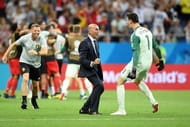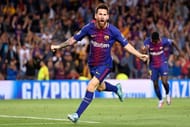"I'm not looking for the best players, Craig, I'm lookin' for the right ones."
That was how Herb Brooks' reign as the coach of the US Hockey team began, and it ended with the greatest upset in modern sporting history with the United States winning the Olympic gold over the USSR.
Whether that was an actual quote said by the man himself, or a sassy line added by a writer for the movie based on him - aptly named 'Miracle', is not what we are here to discuss. What we are here to talk about is, in fact, the accuracy of the words.
As the World Cup has boiled down to its final four, we have in our hands something we haven't witnessed - Neither Germany, Argentina nor Brazil in the semis.
Instead, we are left with one golden generation, one last chance for another golden generation, what was considered their worst ever World Cup squad after their golden generation squandered all their potential and another on the throes between a has-been and a soon-to-be-golden generation.
None of these teams - Belgium, Croatia, England and France - depend on one single player. All of them contain in their ranks superstars, but none of them are exploited for that purpose. In short, the semi-finalists this year are an example of why football is, first and foremost, a team sport.
This is the reason why Argentina and Portugal did not make it here. They were too distracted from their stars to cohere into a fully functioning unit. It was the same reason why even Brazil and Germany faltered on their journey.
Germany

After a surprising opener in which Joachim Loew dropped Marco Reus for Julian Draxler, and the Germans were taken apart by the pace of the Mexicans, he did everything right in the second game. He dropped the 'undroppable' Mesut Ozil, included Reus, and dropped Sami Khedira in favour of Sebastian Rudy as the defensive midfielder.
It worked out in the end for them. Yes, it took a last-gasp winner from Toni Kroos to win the match, but things looked better for the team in terms of the overall performance. An untimely injury to Rudy forced him out of the third game, and we know how that ended.
That is not to say that Rudy's absence was the sole reason for Germany's dumping out of the tournament. But the system under which Germany thrived crumbled because of the lack of necessary pieces.
That is how systems work. That is why systems work. Everything is a vital cog, but from the outside, everything looks interchangeable.
Belgium

Disclaimer: I am not a big fan of Roberto Martinez over his refusal to call up Radja Nainggolan to the squad and his time at Everton. But I grudgingly admit that Martinez managed to pull one over Brazil's Tite, nicknamed "the Professor'.
After having played the entire tournament with three men at the back, Belgium went for a four-man backline, dropped Dries Mertens - who had been having a fantastic tournament - and opted to bring in Marouane Fellaini and Axel Witsel into the midfield.
It is a move that is as risky as it is logical - it is a question of whether the added physical quality to the game will be more than the reduced pace of attack - and it turned out to be a masterstroke from Martinez.
Fellaini was monumental for his abilities to act as a defensive midfielder and he played a significant role in the Brazilian midfield not getting a foothold on the game. Once again, it was the system that proved more important for success than the presence of glorified individuals in the roster.
The counter-argument to this, of course, exists. We have seen individual moments of brilliance destroy a collective unit. We have seen our heroes run through defences and bring home an unlikely win.
The problem is that we think that is how football matches are won. It is a case of "survivorship bias", where we are led to think that the outliers are in fact the norm. We fool ourselves that certain players bring victory on their own, no matter how bad their teammates are, or how good the opponents are.
As technology gets more and more integrated into football, teams are constantly analysing the best players and formulating a plan to stop them. Pickford even received a bottle of water that contained the Colombian players and their preferred penalty orientations before the shootout.
But what computers cannot (hopefully) figure out is how a system works with the right players. A form of football that integrates 11 players and their own unique, but co-ordinated way of playing, is much harder to break than a plan that says "Give the ball to X."

It is not just this World Cup that has proved this. It was the tiki-taka of Barcelona that sustained the phenomenon that would later become Lionel Messi. If Messi had started at a system akin to Mourinho's Porto (or even Real Madrid), chances are that we wouldn't know him by now.
Similarly, it was Sir Alex Ferguson's fast-paced gameplay and later Jose Mourinho's counter-attacking play that fostered Cristiano Ronaldo into the goalscorer he is today. Were he to have started at a club that played the ball from the back and relied on perfectly weighted balls into the box, we would have lost one of the most lethal players in the modern era.
It is true that some players are capable of adapting to whatever system they move into - but it mostly tends to be midfielders who preferably operate from the back. It is when you move forward that things start to get different and difficult.
At the end of the day, just like how it happens in real life, the system wins. The system always wins. Heroes can only take you so far. It sounds too pessimistic, but that's how everything - and by extension, football - is.
